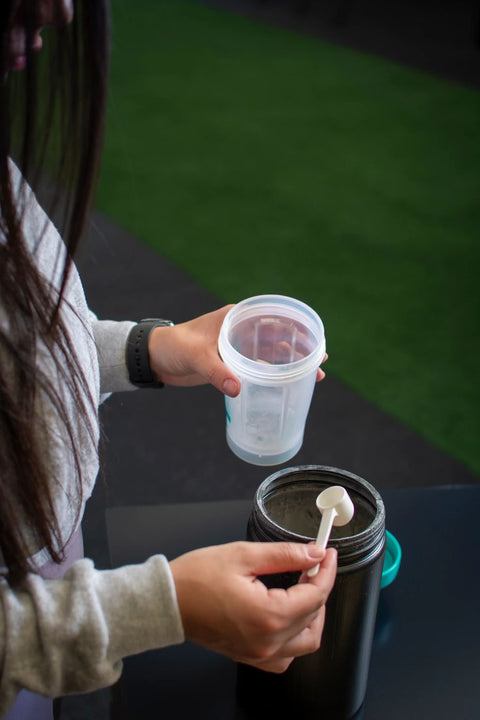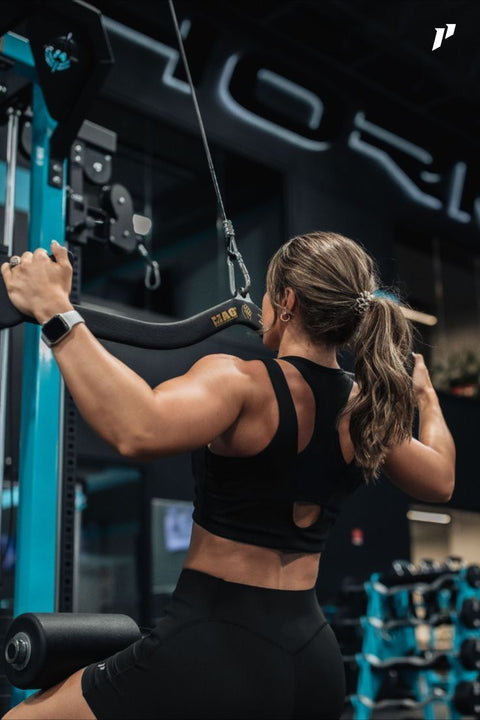Walking into the supplement world for the first time can feel overwhelming. Shelves packed with products, each promising incredible results, where do you even start? The good news is that you don't need a cupboard full of supplements to see real benefits. Starting with a solid foundation of evidence-based essentials will set you up for success without breaking the bank.
Let's break down the supplements that actually deliver results for beginners and are worth your investment.
Start with the Foundation: Protein Powder
If you're only going to invest in one supplement, make it protein powder. It's not the most exciting choice, but it's genuinely one of the most effective tools for anyone starting their fitness journey.
Why Protein Matters: Whether you're trying to build muscle, lose fat, or just get healthier, adequate protein intake is crucial. Research consistently shows that most people training regularly benefit from around 1.6-2.2g of protein per kilogram of body weight daily. That's a lot of chicken breast and eggs, which is where protein powder becomes invaluable.
Which Type to Start With: For most beginners, whey protein concentrate hits the sweet spot of effectiveness, taste, and affordability. It's well-researched, easily digestible, and mixes well. If you're plant-based, a quality pea and rice protein blend delivers excellent results.
The Real Benefits: Protein powder makes hitting your daily targets easier and more convenient. It supports muscle recovery after training, helps you feel fuller for longer, and provides a quick, high-quality protein source when whole foods aren't practical. It's simple, it works, and it's backed by decades of research.
Creatine Monohydrate: The Performance Essential
If there's a second supplement every beginner should consider, it's creatine monohydrate. We've covered this elsewhere, but it bears repeating, creatine is one of the most researched, effective, and affordable supplements available.
Why Beginners Benefit: When you're new to training, you're in a prime position to make rapid progress. Creatine helps you train harder, recover better between sets, and build strength more effectively. The research is clear: creatine works, and it works particularly well for people new to resistance training.
How to Use It: Start with 3-5g daily. You can take it any time, with your protein shake, in your morning coffee, or with a meal. Consistency matters more than timing. Within a few weeks, you'll likely notice you can push harder in your sessions and recover better between sets.
The Investment: Creatine is incredibly affordable, often costing less than a dollar per serve. For the performance benefits you get, it's arguably the best value supplement on the market.
Omega-3 Fish Oil: The Health Essential
While protein and creatine support your training directly, omega-3 fatty acids support your overall health and recovery. Most Australians don't get enough omega-3s from their diet, making supplementation particularly valuable.
The Research: Omega-3s (particularly EPA and DHA) have extensive research backing their benefits for heart health, brain function, joint health, and reducing inflammation. For people training regularly, the anti-inflammatory properties can support recovery and joint health.
Quality Matters: Look for fish oil supplements with high EPA and DHA content (aim for at least 1000mg combined per serve). Third-party testing is crucial here, you want to ensure purity and absence of contaminants.
Daily Habits: Taking fish oil with meals improves absorption and reduces any fishy aftertaste. It's one of those supplements that supports long-term health alongside your training goals.
Vitamin D: The Often-Overlooked Essential
Vitamin D deficiency is surprisingly common in Australia, despite our sunny climate. Many people spend most of their time indoors, use sunscreen religiously (which is good for skin health), or simply don't synthesise vitamin D efficiently.
Why It Matters: Vitamin D plays roles in bone health, immune function, mood, and even muscle function. Research has linked adequate vitamin D levels to better training outcomes and overall health.
Testing First: Ideally, get your vitamin D levels tested before supplementing. Many Australians are surprised to find they're deficient. Your GP can arrange this, and it helps determine the appropriate dose.
Supplementation: If you're deficient or insufficient, vitamin D3 supplementation is inexpensive and effective. It's particularly important during winter months when sun exposure is limited.
What About Pre-Workout?
Pre-workout isn't essential for beginners, but it can be a valuable addition if you're struggling with energy for training sessions. A quality pre-workout provides that extra boost to help you show up and train hard consistently.
If you decide to add pre-workout, start with a half serve to assess your tolerance to caffeine and other ingredients. Look for products with transparent labelling that show exactly what you're getting.
The "Nice to Have" Additions
Once you've got the foundations covered, you might consider:
Multivitamin: A quality multivitamin acts as nutritional insurance, filling potential gaps in your diet. It's not a replacement for good nutrition, but it supports overall health alongside your training.
BCAAs/EAAs: These can be useful if you train fasted or struggle to hit protein targets, though if you're already using protein powder effectively, they're less critical as a starting point.
Electrolytes: Valuable if you train intensely, sweat heavily, or live in hot climates. They support hydration and performance during longer sessions.
What You DON'T Need as a Beginner
Let's save you some money. As a beginner, you don't need:
- Testosterone boosters: Your natural production is fine, especially if you're eating well and training consistently
- Fat burners: These are rarely worth the investment, especially when you're starting out
- Fancy creatine formulations: Stick with monohydrate, it's proven and affordable
- Excessive supplements: More isn't better. Focus on the foundations first
The Smart Beginner's Supplement Stack
Here's a realistic, effective starting point:
Essential Tier (Start Here):
- Quality protein powder (whey concentrate or plant-based blend)
- Creatine monohydrate
- Omega-3 fish oil
Important Tier (Add When Ready):
- Vitamin D (if deficient)
- Quality multivitamin
Performance Tier (Optional Additions):
- Pre-workout (if energy is an issue)
- Electrolytes (if training intensely)
This approach gives you genuine benefits without overwhelming your budget or your bathroom cabinet.
Investing Wisely
As a beginner, you're better off investing in three quality supplements that you'll use consistently than ten mediocre products that sit unused. Quality matters, look for:
- TGA-compliant products: Ensures safety standards
- Third-party testing: Particularly for protein and fish oil
- Transparent labelling: You should know exactly what you're getting
- Reputable brands: Established companies with proven track records
The Bigger Picture
Supplements are called supplements for a reason, they support your nutrition and training, they don't replace them. As a beginner, your biggest returns come from:
- Consistent training with progressive overload
- Adequate protein intake (supplements help with this)
- Sufficient sleep and recovery
- Managing stress
- Staying hydrated
Supplements enhance these fundamentals, helping you recover better, train harder, and progress faster. But they work best when the basics are in place.
Starting Your Supplement Journey
Begin with the essentials, protein powder and creatine monohydrate. These two alone will support your training effectively and deliver noticeable benefits. Add omega-3s for overall health support, and consider vitamin D if you're deficient.
From there, you can expand based on your specific needs, goals, and how you respond. Some people add pre-workout for energy, others prioritise recovery supplements, and some keep it simple with just the foundations.
The best approach is the one you'll stick with consistently. Choose supplements that fit your budget, support your goals, and that you'll actually use every day. Start smart, focus on quality over quantity, and you'll build a supplement routine that genuinely supports your fitness journey.
Remember, everyone's journey is different. What works brilliantly for your training partner might not be what you need right now. Start with the proven essentials, pay attention to how your body responds, and adjust from there. That's how you build a sustainable, effective supplement routine that grows with you.






